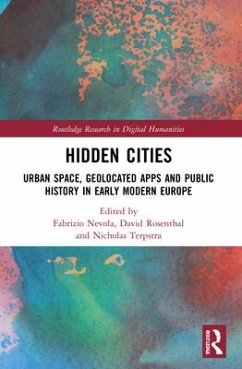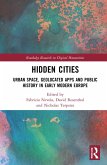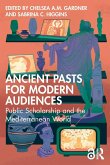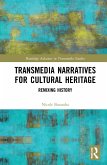Hidden Cities
Urban Space, Geolocated Apps and Public History in Early Modern Europe
Herausgeber: Nevola, Fabrizio; Terpstra, Nicholas; Rosenthal, David
Hidden Cities
Urban Space, Geolocated Apps and Public History in Early Modern Europe
Herausgeber: Nevola, Fabrizio; Terpstra, Nicholas; Rosenthal, David
- Broschiertes Buch
- Merkliste
- Auf die Merkliste
- Bewerten Bewerten
- Teilen
- Produkt teilen
- Produkterinnerung
- Produkterinnerung
This ground-breaking collection explores the convergence of the spatial and digital turns through a suite of smartphone apps (Hidden Cities) that present research-led itineraries in early modern cities as public history.
Andere Kunden interessierten sich auch für
![Hidden Cities Hidden Cities]() Hidden Cities142,99 €
Hidden Cities142,99 €![Ancient Pasts for Modern Audiences Ancient Pasts for Modern Audiences]() Ancient Pasts for Modern Audiences58,99 €
Ancient Pasts for Modern Audiences58,99 €![Transmedia Narratives for Cultural Heritage Transmedia Narratives for Cultural Heritage]() Nicole BasarabaTransmedia Narratives for Cultural Heritage42,99 €
Nicole BasarabaTransmedia Narratives for Cultural Heritage42,99 €![Transmedia Narratives for Cultural Heritage Transmedia Narratives for Cultural Heritage]() Nicole BasarabaTransmedia Narratives for Cultural Heritage152,99 €
Nicole BasarabaTransmedia Narratives for Cultural Heritage152,99 €![Making Space Public in Early Modern Europe Making Space Public in Early Modern Europe]() Making Space Public in Early Modern Europe59,99 €
Making Space Public in Early Modern Europe59,99 €![Brunelleschi's Dome Brunelleschi's Dome]() Dr Ross KingBrunelleschi's Dome20,99 €
Dr Ross KingBrunelleschi's Dome20,99 €![The Renaissance The Renaissance]() Alison M. BrownThe Renaissance40,99 €
Alison M. BrownThe Renaissance40,99 €-
-
-
This ground-breaking collection explores the convergence of the spatial and digital turns through a suite of smartphone apps (Hidden Cities) that present research-led itineraries in early modern cities as public history.
Hinweis: Dieser Artikel kann nur an eine deutsche Lieferadresse ausgeliefert werden.
Hinweis: Dieser Artikel kann nur an eine deutsche Lieferadresse ausgeliefert werden.
Produktdetails
- Produktdetails
- Routledge Research in Digital Humanities
- Verlag: Taylor & Francis Ltd
- Seitenzahl: 274
- Erscheinungstermin: 25. September 2023
- Englisch
- Abmessung: 234mm x 156mm x 15mm
- Gewicht: 428g
- ISBN-13: 9780367775933
- ISBN-10: 036777593X
- Artikelnr.: 68713815
- Herstellerkennzeichnung
- Libri GmbH
- Europaallee 1
- 36244 Bad Hersfeld
- gpsr@libri.de
- Routledge Research in Digital Humanities
- Verlag: Taylor & Francis Ltd
- Seitenzahl: 274
- Erscheinungstermin: 25. September 2023
- Englisch
- Abmessung: 234mm x 156mm x 15mm
- Gewicht: 428g
- ISBN-13: 9780367775933
- ISBN-10: 036777593X
- Artikelnr.: 68713815
- Herstellerkennzeichnung
- Libri GmbH
- Europaallee 1
- 36244 Bad Hersfeld
- gpsr@libri.de
Fabrizio Nevola is Professor of Art History and Visual Culture at the University of Exeter. His research focuses on urban and architectural history of early modern cities, with a particular attention for everyday life and public space in Italy, to which he also applies digital humanities approaches. David Rosenthal is Research Associate at the University of Exeter. He works on urban social history in early modern Italy, with a focus on public space, ritual, and work. He co-created the Hidden Florence app with Fabrizio Nevola and is supervising editor of the Hidden Cities apps. He is currently editing a collection on disaster in the early modern world. Nicholas Terpstra is Professor of History at the University of Toronto. He works at the intersections of gender, politics, charity, and religion in early modern Italy, focusing on civil and uncivil society, religious refugees, and the digital mapping of early modern social realities and relations.
Part 1 0. Introduction 1. Revisioning the City: Public History and Locative
Digital Media 2. Heritage, placemaking and user experience: An industry
perspective Part 2 3. Reconstructing the early modern news world: urban
space, political conflict, and local publishing in Hamburg 4. Making
Disability Visible In Digital Humanities: Blind Street Singers In Early
Modern Valencia 5. Navigating Places of Knowledge: The Modern Devotion and
Religious Experience in Late Medieval Deventer 6. "Trento, the Last Chance
for a Beer". Mobility, Material Culture and Urban Space in an Early Modern
Transit City 7. 'Stewarding Civic Spaces: Place and Social Mobility in
Elizabethan Exeter' 8. City of Women: Mapping Movement, Gender, and
Enclosure in Renaissance Florence Part 3 9. The Hidden Cities apps: digital
engagement through geolocating museum collections 10. Hidden in plain
sight? UX apps and the sustainable management of urban tourism 11. 3D
models and locative AR: Hidden Florence 3D and experiments in
reconstruction
Digital Media 2. Heritage, placemaking and user experience: An industry
perspective Part 2 3. Reconstructing the early modern news world: urban
space, political conflict, and local publishing in Hamburg 4. Making
Disability Visible In Digital Humanities: Blind Street Singers In Early
Modern Valencia 5. Navigating Places of Knowledge: The Modern Devotion and
Religious Experience in Late Medieval Deventer 6. "Trento, the Last Chance
for a Beer". Mobility, Material Culture and Urban Space in an Early Modern
Transit City 7. 'Stewarding Civic Spaces: Place and Social Mobility in
Elizabethan Exeter' 8. City of Women: Mapping Movement, Gender, and
Enclosure in Renaissance Florence Part 3 9. The Hidden Cities apps: digital
engagement through geolocating museum collections 10. Hidden in plain
sight? UX apps and the sustainable management of urban tourism 11. 3D
models and locative AR: Hidden Florence 3D and experiments in
reconstruction
Part 1 0. Introduction 1. Revisioning the City: Public History and Locative
Digital Media 2. Heritage, placemaking and user experience: An industry
perspective Part 2 3. Reconstructing the early modern news world: urban
space, political conflict, and local publishing in Hamburg 4. Making
Disability Visible In Digital Humanities: Blind Street Singers In Early
Modern Valencia 5. Navigating Places of Knowledge: The Modern Devotion and
Religious Experience in Late Medieval Deventer 6. "Trento, the Last Chance
for a Beer". Mobility, Material Culture and Urban Space in an Early Modern
Transit City 7. 'Stewarding Civic Spaces: Place and Social Mobility in
Elizabethan Exeter' 8. City of Women: Mapping Movement, Gender, and
Enclosure in Renaissance Florence Part 3 9. The Hidden Cities apps: digital
engagement through geolocating museum collections 10. Hidden in plain
sight? UX apps and the sustainable management of urban tourism 11. 3D
models and locative AR: Hidden Florence 3D and experiments in
reconstruction
Digital Media 2. Heritage, placemaking and user experience: An industry
perspective Part 2 3. Reconstructing the early modern news world: urban
space, political conflict, and local publishing in Hamburg 4. Making
Disability Visible In Digital Humanities: Blind Street Singers In Early
Modern Valencia 5. Navigating Places of Knowledge: The Modern Devotion and
Religious Experience in Late Medieval Deventer 6. "Trento, the Last Chance
for a Beer". Mobility, Material Culture and Urban Space in an Early Modern
Transit City 7. 'Stewarding Civic Spaces: Place and Social Mobility in
Elizabethan Exeter' 8. City of Women: Mapping Movement, Gender, and
Enclosure in Renaissance Florence Part 3 9. The Hidden Cities apps: digital
engagement through geolocating museum collections 10. Hidden in plain
sight? UX apps and the sustainable management of urban tourism 11. 3D
models and locative AR: Hidden Florence 3D and experiments in
reconstruction








